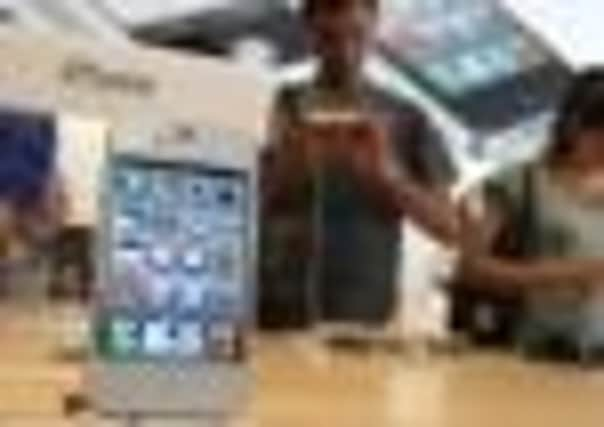Britons are best in Europe for using smartphones


The Ofcom study found smartphone ownership nearly doubled in the UK between February 2010 and August 2011, with around half the population now in possession of handsets such as the iPhone and BlackBerry.
UK consumers are also more likely to shop online, the survey said, with nearly 80 per cent of people having purchased goods or services over the internet.
Advertisement
Hide AdAdvertisement
Hide AdOfcom’s sixth International Communications Market report into the global communications market looked at take-up, availability and use of broadband, landlines, mobiles, TV and radio in 17 countries.
It showed that despite the economic downturn, global communications revenues grew by 3.4 per cent in 2010, compared with 2009, mainly driven by strong growth in Brazil, Russia, India and China.
Matt Bath, technology editor at consumer watchdog Which?, said consumers were benefiting from being able to use their smartphones to compare prices while shopping on the high street.
He said: “Smartphones have become really important for how we engage with the world. They’re really easy to use when we’re out and about and want to compare online prices when you are in a store.”
He said the uptake in Britain had been higher than elsewhere due to the visibility of the UK’s telecommunications industry.
He added: “We have quite a large and visible telecommunications industry and there are some good deals out there.
“People are using their smartphones to organise their lives. Everything from checking Facebook to online shopping – they only have to reach for their phone in their jacket pocket.”
The report found that eight out of ten UK internet users said they had ordered goods or services online in 2010, higher than any other European country, with just 27 per cent of consumers in Italy claiming to have done so.
Advertisement
Hide AdAdvertisement
Hide AdUK internet users were also more likely to visit retail websites online than other countries, with almost 90 per cent claiming to have done so in the past year.
As well as more UK consumers shopping online, they also spent more time on retail sites – an average of 84 minutes in January 2011, compared with around 20 minutes for consumers in Poland and Italy.
Leigh Sparks, a professor of retail studies at the Institute of Retail Studies at Stirling University, said there were a number of reasons why people in the UK were more happy to spend money online than their European counterparts.
He said: “I’m surprised that the figures for internet shopping are as high, but I’m not surprised at where we are compared with other countries.
“Part of it is our willingness to spend on credit. But compared to countries like Italy, we also have a much more pressured lifestyle and spend our time shopping in a different way.
“Mobile shopping via smartphones, for example, is becoming an integral part of how we live our lives.”
The Ofcom research into the prices consumers pay for their communications services found prices in the UK compared favourably to those available in other countries.
The analysis examined the prices of a typical “basket” of communications services, including fixed-line phone, mobile phone, broadband and pay TV.
Advertisement
Hide AdAdvertisement
Hide AdIt compared the prices available to consumers in the UK with those in France, Germany, Italy, Spain and the US.
Overall, the UK offered the lowest prices for all five baskets based on buying services individually and four of the five baskets when including multi- service “bundles”.
The price of mobile phone services in the UK were 36 per cent lower than in the next least expensive country, France, and were 10 per cent lower than a year previously.
However, prices in the UK for low-use mobile phone services, such as pay as you go, increased between July 2010 and July 2011. The study also found superfast broadband is rapidly becoming available.
Ofcom’s chief executive Ed Richards said: “Across the globe people are embracing e-commerce and social media with enthusiasm. Our research shows the UK communications market is performing well, with prices, the range of services and innovation standing up well against international benchmarks.
“There are also issues which we will monitor carefully, such as the future roll-out of 4G mobile services.
“We are pressing ahead with plans to release this valuable spectrum at the end of next year which will enable new mobile services for consumers.”
The survey also found despite warnings about the internet leading to the death of traditional TV, viewing in the UK had increased by almost 8 per cent in 2010, compared with 2009.
Advertisement
Hide AdAdvertisement
Hide AdThe average person watches just over four hours of TV per day, according to the report. However, more than a quarter of UK internet users now watch TV online every week, an increase of three percentage points from 2010, and higher than any of the other countries surveyed.
The popularity of a wide variety of free-to-view catch-up TV services, such as BBC iPlayer, has helped to drive online TV viewing in the UK, Ofcom said.
Social networking websites, such as Facebook and Twitter, continue to be popular, with more than three-quarters of consumers surveyed saying they visit a social networking site, with the majority saying they visit them on a daily basis.
UK consumers are more likely to access social networking sites on a mobile than other countries, with 43 per cent of those with social networking site profiles saying they do so, compared to 30 per cent in the US.
People in the UK were less likely, to use the internet to make phone calls. Just under a fifth of UK broadband subscribers used services such as Skype to make internet phone calls, compared with 28 per cent in Italy and 26 per cent in France.